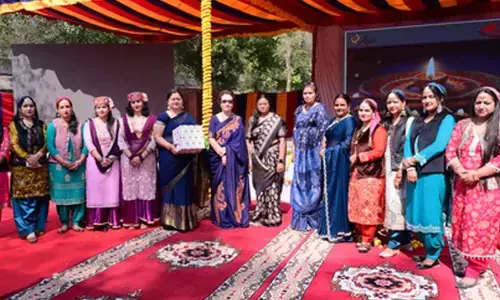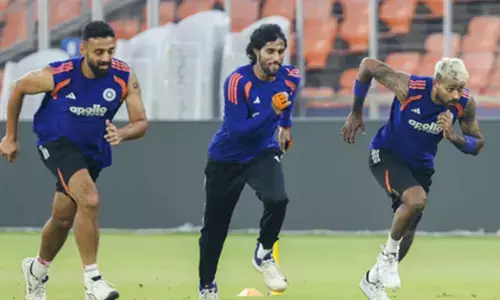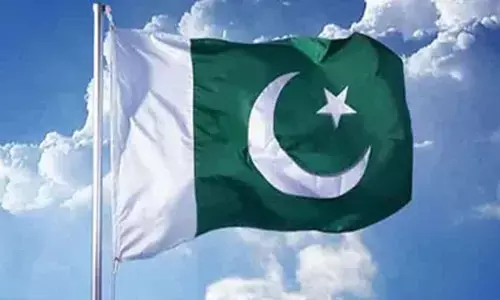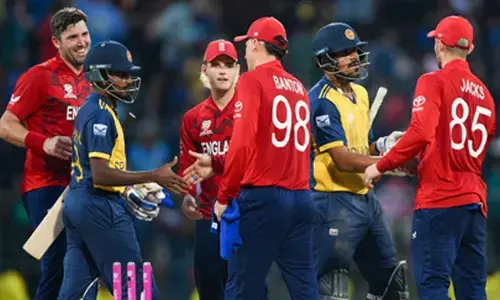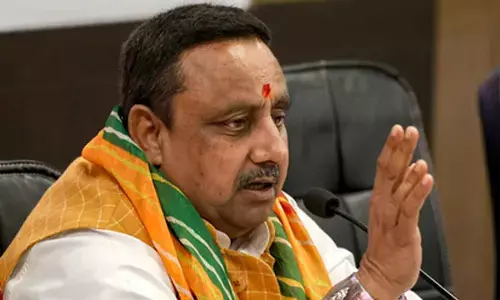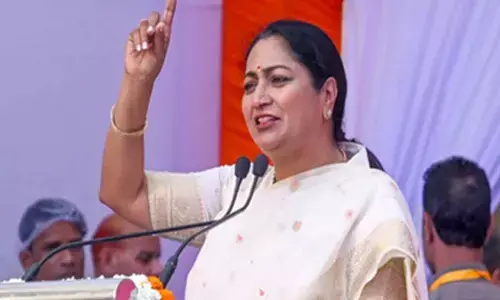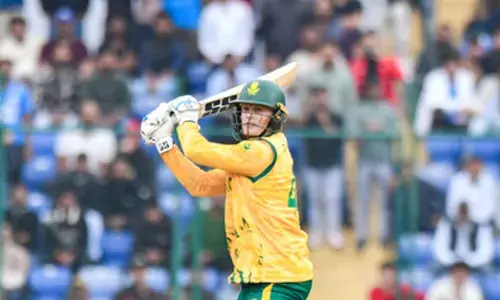AP Bifurcation: Seemandhra Politicians' Arguments Unconstitutional

AP Bifurcation: Seemandhra Politicians' Arguments Unconstitutional, Article 3 of India's Constitution. This is to call the bluffs of the political opportunists of Seemandhra, mainly – Kiran Kumar Reddy, Chandra Babu Naidu, Jayaprakash Narayan, Jaganmohan Reddy, and other minions as well as those others like Rajnath Singh.
This is to call the bluffs of the political opportunists of Seemandhra, mainly – Kiran Kumar Reddy, Chandra Babu Naidu, Jayaprakash Narayan, Jaganmohan Reddy, and other minions as well as those others like Rajnath Singh, Narendra Modi, Deve Gouda, Mulayam Singh Yadav, Mamata Banerji, Prakash Karat who issue utterly nonsensical statements that insult the Founding fathers of India and its Constitution, like Dr Ambedkar, K. Santanam, Pandit Hridaynath Kunzru, Pandit Thakurdas Bhargava, Prof K.T. Shah, Prof. Shibanlal Saksena, Chaudhri Ranbir Singh, and H.V. Kamath.
The first meeting of the Constituent Assembly of India took place in Constitution Hall, New Delhi, on Monday, the 9th December 1946, at Eleven of the Clock. Acharya J. B. Kripalani (United Provinces: General): requested Dr. Sachchidananda Sinha to take the Chair as temporary Chairman.
Article 3 was created and written in such a manner as if the Founding Fathers were thinking of Telangana and its People almost seventy years ahead. It was essentially written to free a minority of population from the clutches and the tyranny of the majority.
.jpg)
In fact, the first population that benefited from the provisions of Article 3 was the very same Seemandhras who were agitating for a separate state of their own, Andhra, from Madras in which they were a minority. What the current Seemandhra leadership is demanding today would have denied them a State. Such a thoughtless and ungrateful conduct is nothing but perfidy (treachery). It is akin to burning the boat after reaching the shores so that nobody else could use it.
I have obtained these actual quotes from the digitized original Constitutional Assembly Debates as archived by the Indian Parliament. These Debates cover almost 12,000 typed pages but I have only perused pertinent debates for Article 3.
The politicians and so called Andhra Intellectual Federation of Seemandhra neither have the intellect nor knowledge or the patriotism possessed by the stalwarts I mentioned who authored Article 3 of India’s Constitution. These minions are ill-educated, ill-informed, and therefore ill-qualified to speak on the issue of State Reorganizations which is embodied in Article 3. Obviously, they have never studied the Constitution or the Founding Father’s Intentions and Reasons for writing the Article in such a way!
I may rehash here that the Article 3 bestows the sole authority of reorganizing States, one state at a time or many states at a time although the President of India has to approve before placing the bill in the Parliament.
The most enlightening part of Article 3 is that the power to reorganize State(s) is placed in the People (Parliament) by expressly removing it from the Government’s purview. The second most progressive part of Article 3 is that Reorganization of State(s) can be initiated by ANY member of Parliament and not limited to the party in power. Read these clarifications enunciated by Dr Ambedkar, Chairman of the Committee charged with authoring the Article 3:
The Honourable Dr. B. R. Ambedkar:
Mr. Vice-President, if one were to compare the amended proviso with the original proviso as it was set out in the Draft Constitution, the Members will see that the new amendment introduces two changes.
One is this: in the original draft the power to introduce the Bill was given exclusively to the Government of India. No Private Member of Parliament had the power, under the original draft, to propose any legislation of this sort attention of the Drafting Committee was drawn to the fact that this was a somewhat sever and unnecessary curtailment of the right of the members of Parliament to move any motion they liked and in which they felt concerned. Consequently we deleted this provision giving the power exclusively to the Government of India, and gave it to the President and stated that any such Bill whether it was brought by the Government of India or by any private Member should have the recommendation of the President. That is one change.
The second change is this: under the original Article3, the power of the Government of India to introduce legislation was restricted by two conditions which are mentioned in (a) (i) and (ii). The conditions were that there must be, before the initiation of any action, representation made to the President by a majority of the representatives of the territory in the Legislature of the State, or a resolution in that behalf passed by the Legislature of any State-whose boundaries or name will be affected by the proposal contained in the Bill. Here again, it was represented that there might be a small minority which felt very strongly that its position will not be safeguarded unless the boundary of the State were changed and that particular minority was permitted to join their brothers in the other State, and consequently if these brothers remained there, action would be completely paralysed. Consequently, we propose now in the amended draft, to delete (i) and (ii) of (a) and also (b) of the original draft. …..In the case of (a), that is to say, reorganisation of territories of States falling in Part I, all that is necessary is consultation. Consent is not required. All that the President is called upon to do is to be satisfied, before making the recommendation, that their wishes have been consulted.
In my opinion, the MOST enlightening and the most progressive provision, not expressly pointed but most emphatically stated by the Founding fathers, is the Right of Aggrieved People (citizens) to petition the President requesting partition of a State in the interest of their welfare. The Founding Fathers were very deeply concerned of the plight of a minority (not necessarily religious or such) in a large state and the tyranny of the majority. They were so worried that the majority will never allow the minority population to represent themselves effectively. They did not want the majority to suppress the voice of the minority of the population in a state. Read the forceful and unambiguous declaration by these Founding fathers in what the Article 3 stands for:
Prof. K. T. Shah:
"Lest I should be misunderstood, I would at once add that I am certainly not in love with the present position, or the continuance of the alignment of the provinces and States as they stand today. They need to be altered, they must be altered. But they must be altered only as and how the people primarily affected desire them to be altered, and not in accordance with the preconception, the notion, of such adjustment that those at the Centre may have, even if some of those at the Centre are the representatives of the people concerned.
I make it imperative, therefore, that the first proposition, the initiation of the movement either to integrate or to separate, either to readjust the boundaries or to bring about any new form of configuration, must commence with the people themselves. I admit that in democracy majority rule should prevail. But the majority has not the monopoly of being always right and still less to be always just."
The Honourable Shri K. Santanam:
"Mr. Vice-President, I wonder whether…, it would mean that no minority in any State can ask for separation of territory, either for forming a new province or for joining an adjacent State unless it can get a majority in that State legislature. …Take the case of the madras Province for instance. The Andhras want separation. They bring up a resolution in the madras legislature. It is defeated by a majority. There ends the matter. The way of the Andhras is blocked altogether. They cannot take any further step to constitute an Andhra province. On the other hand, as re-drafted by the Honourable Dr. Ambedkar, if the Andhras fail to get a majority in the legislature, they can go straight to the President and represent to him what the majority did in their case and ask for further action removing the block in the way of a province for them. If they are able to convince the President, he may recommend it and either the Government of India may themselves sponsor legislation for the purpose or any private Member or a group in the Central legislature can take up the question”
Pandit Hriday Nath Kunzru (United Provinces: General):
"Mr. Vice-President, .All that I am asking for is that the consent of the States should not be necessary for a re-organisation of their territories. Consultation with them should be quite enough." "…
I do not see, why the previous consent of the States should be required in connection with Article 3and more than it is required in connection with matters dealt with in Articles 226, 227 and 294.
Pandit Thakur Dass Bhargava (East Punjab: General):
"The first point which I would like to submit is that every part of India should be given this facility, that, should it decide to secede from one part and to accede to another, then there should be no impediment in its way
Since the war we have been hearing that everyone has got the right of self-determination…. If the people of an area want separation, then the right of self-determination should be given to them…. I would like the Congress Government to respect the wishes of the areas, which desire to separate from any province and that no hurdles are placed in their way; on the other hand, all legal aid should be given for the formation of a new province.
Parliament, and not the President, should have the right to determine the matter after taking into account the opinion of the people of the area concerned and of the vote of the provincial legislature. It is therefore necessary that every Member of the parliament should have the right to give notice of such a bill. Views of the provincial legislature may be taken but the changes should be effected in accordance with the wishes of the people of the area, who want separation. If this is not done then the principle of self-determination would be nowhere. We used to hear that after the attainment of Swaraj the right of selfdetermination would be given to all…. Views of the legislatures may be invited, and may be taken into consideration; but the determining factor should be the vote of the people of the area, which wants to separate."
Shri Gopikrishna Vijayavargiya [United State of Gwalior - Indore - Malwa (Madhya Bharat)]:
"Mr. Vice-President, …. there is no question of taking the consent of the States…. I think, mere consultation would be sufficient in the matter of the States also as it is in connection with the Provinces….
" Prof. Shibban Lal Saksena:
Mr. Vice-President, Sir, this is a fundamental matter, ..The only condition is this, namely, that the President after he receives notice of such a motion from any Member will try to take the opinion of the area concerned and then, of course after consulting his Ministry, give his recommendation for moving the Bill…. if the President feels that the people of an area - the majority of them - are of the opinion that they would be happier if they go to some other State or Province, he would advise the Prime Minister, and probably the Prime Minister also will agree with him that the motion should be allowed and that Parliament should be allowed to discuss the question. I think that gives full liberty and opportunity to every area which desires a change of boundaries.
Chaudhari Ranbir Singh (East Punjab: General):
"…I am afraid the amendment would reduce the chance of success of any community which is in majority in any area but happens to be in minority in that State and I am afraid it would also reduce the importance of their demand and narrow the opportunity of their having a say in the matter….The provision as it stands in the draft lays down that if the majority of the people in any area demand that their area be joined to any other State or to a new State, their demand can be taken into consideration… I am afraid their demand would lose some of its weight, and particularly this would be the case of the people of such areas as have no leader of their own, no press of their own and no other means to make their voice heard …Though the people of this area wanted that their region should be jointed to Delhi or Haryana yet nothing happened as they had no leader of their own nor any Press of their own. The loyalty of those people of U. P. who had made this demand, was doubted and their voice was stifled to an extent beyond description. A ban was laid on them by the Provincial Congress Committee not to make such a demand, and they were asked not to raise any voice for any alteration in the boundaries of the province. …. …I want that it should be changed so as to include without any doubt the provision that when the Centre consults the provincial legislature the opinion of the majority of the representatives of the territory, which wants to separate itself and join another province, should also be on record and that their recorded opinion should appear before the Central Assembly so that it may know what that particular territory desires.]"
Shri H. V. Kamath (C.P. and Berar: General):
"…. I am inclined to agree, therefore, with Pandit Kunzru's argument …we should not go beyond obtaining the views of the rulers of the States or the legislatures of the States, whatever the case may be.
As you read through these Members' forceful and wise arguments on the issue of a region separating from a State, you cannot but appreciate how deeply they analyzed and how carefully they articulated the concerns and rights of their citizens with regard to their desire for self-determination in forming a State of their own. They even discussed how a minority within a State could be oppressed and subjugated by the majority of the state. And how the weaker and less powerful regions could be made helpless and deprived of their rightful demand to form a separate State."
All the members of the Constituent Assembly were more concerned and supportive of the Minorities in a State and their right to separate from a State than concern for the rule of majority. Also, they NEVER uttered the words Law and Order while debating this issue. They never doubted the ability of the minority people, people of a region, in developing their new separate State. That was never a question in their minds.
And these leaders were remarkable, liberal, democratic and revolutionary in their thought processes even in those early days of the Republic unlike today. They did not think such separations and formations of new States affected the Nation adversely.
How did we end up with such ill-informed, undemocratic, oppressive, intolerant public leaders today in our country? Especially, the Seemandhra politicians and other who are supporting them in their unjust and greedy pursuit?
Seemandhra Politicians and the CM, Kiran Kumar Reddy are wasting time and making unconstitutional requirements like obtaining CONSENT the majority of population of the whole state of Andhra Pradesh. COf course, the Seemandhras who form a majority of AP will certainly want to deny the people of Telangana their Constitutionally guaranteed right to ask and receive a state of their own and to guide their own destiny. This kind of tyranny by majority exactly was what was feared by the Founding Fathers and that kind of oppression by majority is what exactly they wanted to remove from being played out.

The constant drumming of “Telugu Jaati” and demand for a unitary linguistic state (one state for one language) by Seemandhras is contrary to the spirit of India’s Constitution as well as its originator, Dr Ambedkar who expressed his strong views on linguistic states In in his book "THOUGHTS ON LINGUISTIC STATES" (1955), Part III, summarized his thoughts on forming linguistic States as follows:
(3) The formula one State, one language must not be confused with the formula of one language, one State.
(4) The formula one language, one State means that all people speaking one language should be brought under one Government irrespective of area, population and dissimilarity of conditions among the people speaking the language. ….This is an absurd formula and has no precedent for it. It must be abandoned. A people speaking one language may be cut up into many States as is done in other parts of the world.
To put it simply, B.R. Ambedkar reiterated that there can be multiple states of one language. He admonished that it is absurd to force one state per language on the population.
The opinions expressed in this article are those of the author and do not necessarily reflect the views of our organisation.
Next Story


